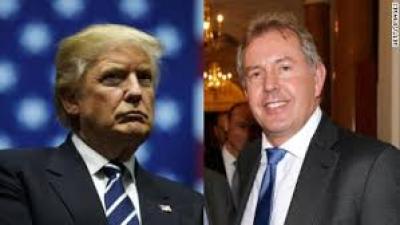Hunt for Mole Futile Because Leaked Memos Widely Circulated En Clair
The faith-based conviction that Donald Trump would lose the United States presidential election led New Zealand into awkward foreign policy fumbles in the aftermath of the Trump ascendancy.
These embarrassing and very public stumbles were compounded by, for example, continuing government donations to the Clinton family foundation.
The utter partisan conviction that Hillary Clinton would win baffled many observers at home and abroad but following the leaking of the British Embassy in Washington memos there is a glimmer of an explanation which is that New Zealand was taking its lead in a shared groupthink with the British foreign affairs apparatus.
The leaked papers demonstrate that from the outset that at a professional level, if not a political level, Britain was utterly hostile to president Trump who they saw as a major and even the ultimate facilitator of Britain’s exit from the EU.
Westminster has sought to obfuscate the leaks in a fog of disinformation centred on the idea that they were the irritable personal value judgements of one official, in the case the British ambassador Sir Kim Darroch.
Yet these same leaked memos also contain strategic estimates of United States policy in for example the recent Straits of Hormuz shadow war with Iran.
Westminster has similarly tried to sustain the belief that the transatlantic memos were decrypted and then broadcast via foreign intervention.
It is now emerging that the memos, by now in clear text, were handed around on a circulation list of hundreds.
The memos are genuine.
This is certified by Whitehall’s failure to invoke any plausible deniability claiming for, example, that the streams of consciousness that have come to light so far were part of a what-if scenario, or some kind of brain storming exercise in a hypothetical vein.
Diplomats are taught only to allow themselves to disclose an opinion on a need to know basis, and this applies especially to written ones.
Excerpts of these communiques, of which there will be more to come, have centred on the florid metaphors used to describe the Trump motives.
Absent is analysis on what exactly is the trade deal that president Trump has in mind for the UK post Brexit?
Whitehall in its fashionable anti-Trump fervour refuses to accommodate the fact that by birth president Trump is as much British as he is American.
His mother was a Scottish emigrant to the United States.
Similarly Whitehall seeks to cloud president Trump’s advice to British prime minister Theresa May.
This was that as long as Britain said it would only leave the EU under a deal with EU, then the EU would never give it a deal just to keep t in the EU.
The smokescreen in its current iteration is to spread the blame around under the generalised collateral that such leaks are the price paid for free and frank discussion, and in doing so ignoring the wikileaks experience which demonstrates the open-letter nature of diplomatic transmission.
Still, the Darroch leaks with their declamatory excerpts has revealed the extent of the partisan idealism allowed to penetrate the UK foreign apparatus and allowed to do so at the expense of technical proficiency in analysing the opportunities presented to the UK by president Trump.
The question remains though as to exactly why en clair memos incorporating such obviously high level inflammatory contents were allowed such free circulation and for a duration of several years?
Not since the civil war of the Cromwellian era has Britain found itself so sundered as it is now by the EU reformation, and this may be one reason for Whitehall failing to understand that this linkage in the Trump context was itself a multiplier on the need to enforce the use of the most measured language, however tempting hip activist words such as “dysfunctional.”
The Darroch Papers confirm that Britain’ public sector in all its forms has found itself vulnerable to the tug of loyalties.
It is a susceptibility that Commonwealth governments need to price into guidance they receive from Whitehall.

